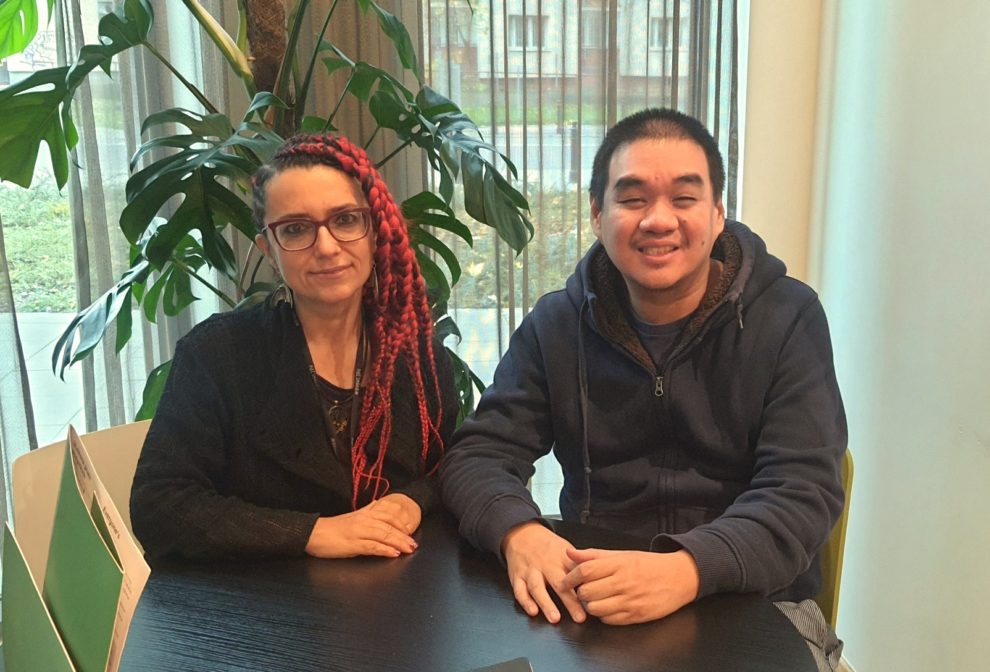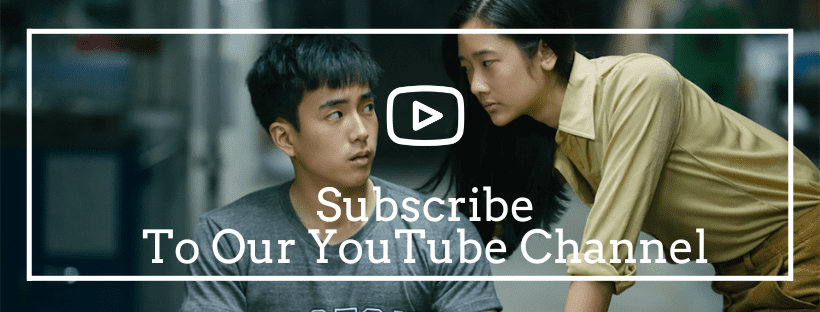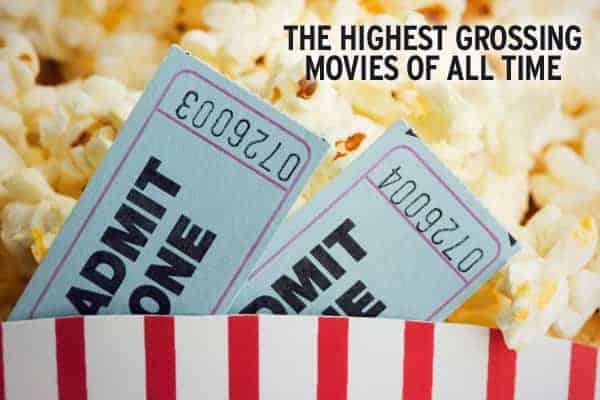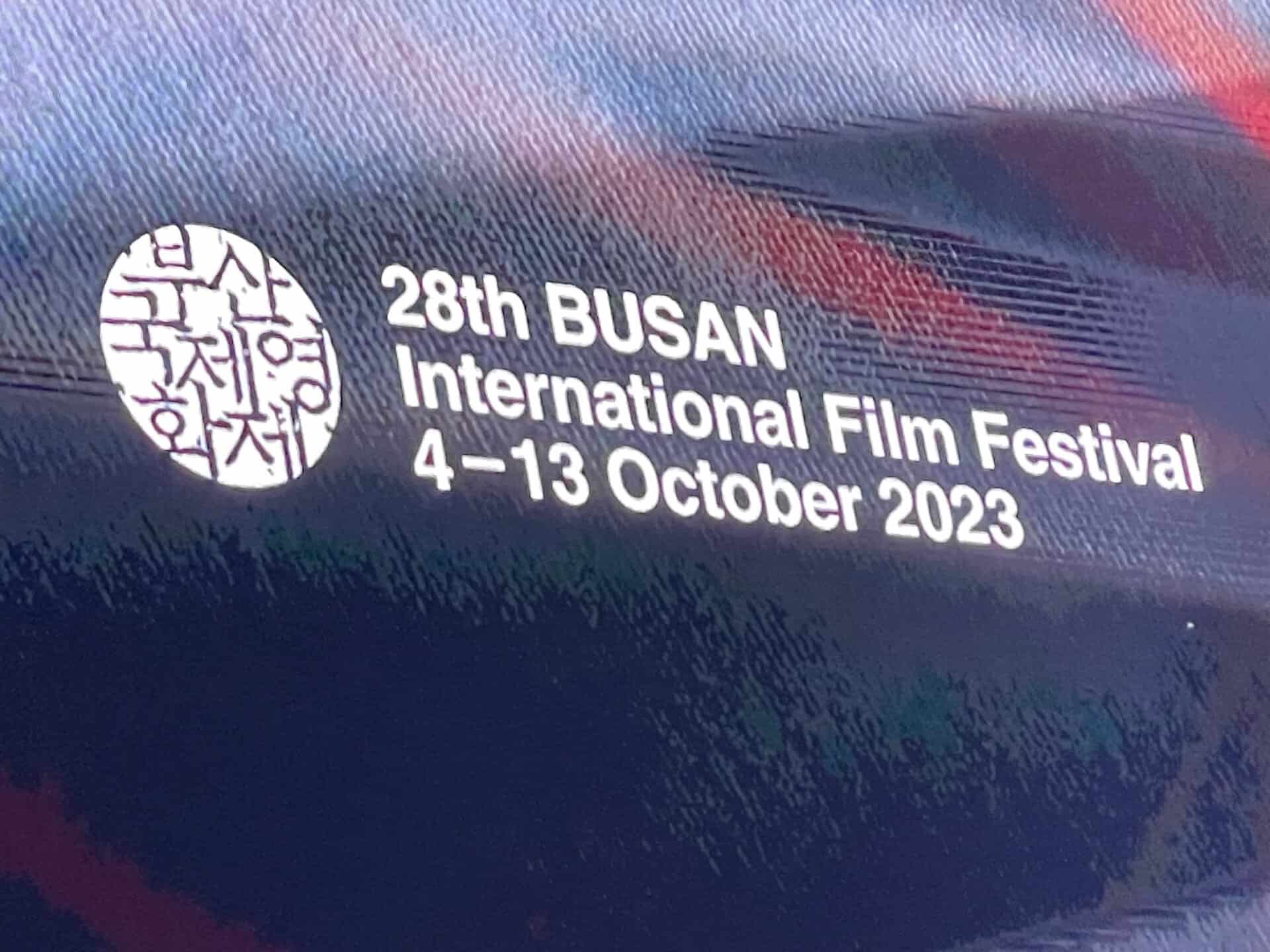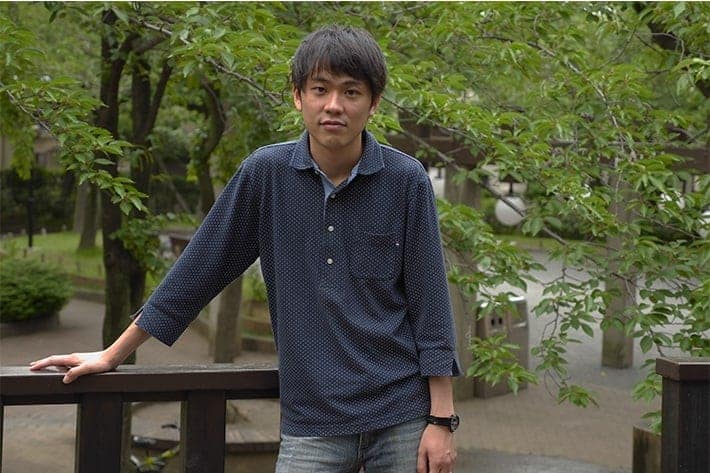Sorayos Prapapan is a Thai director, editor, and sound designer born in 1986. A number of his shorts were screened at international film festivals like Venice, Locarno, and Rotterdam. We meet during the Five Flavours Film Festival to discuss his debut feature “Arnold is a Model Student” (presented also at this year's Locarno main competition). We talk about the Thai educational system and the government's propaganda, finding more in common than we could have expected.
“Arnold is a Model Student” screened at Five Flavours
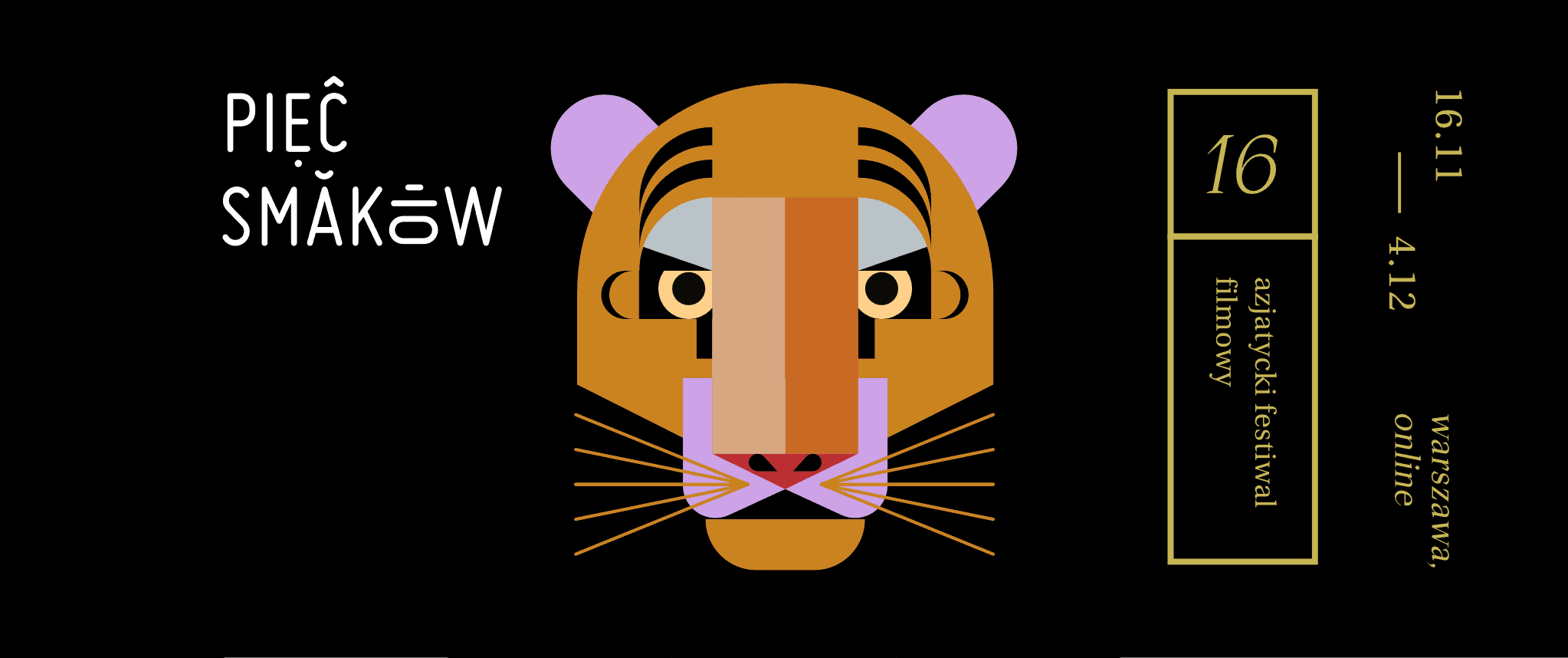
I know that you were born in the year of the tiger. And you finished “Arnold…” in the year of the tiger. Also, this year's Five Flavors visual identification is a tiger. Isn't it a funny coincidence or a lucky charm?
It is! And “tiger” is also kind of my pet name. My mummy used to call me like that when I was a kid. I don't know why. Maybe I was mischievous. I noticed the tiger in this year's festival logo and thought it will be fun to be part of this edition. To add to that, I am also an animal lover and like all kinds of creatures.
Actually, I was going to play a prank on you and put on a tiger T-shirt, but didn't have any.
[laughter] No worries.
[Ed. Editing this interview post-festival, we can now say that “tiger charm” worked, as “Arnold is a model student” grabbed the grand prix. ]
Okay, so let's go back to serious matters because your movie deals with serious matters. It's referring to the Bad Student Movement initiated in 2020, during the pandemic. Could you tell us something more about it?
My country has a lot of problems, really big problems. We gotta start with the politics, our government. Our PM gained his position because they did a coup d'état 8 years ago with the army to get rid of a democratically-elected government, saying it was corrupted. And there were no elections for a few years. They also changed the constitution. There was a referendum on it, and most of the people voted “yes”, because if they said no, there would be a new constitution proposal, and the government would stay anyway. So they just thought “oh, fu*** it, let's vote “yes”. But for me voting yes to the law they wrote meant accepting their power. Now they claim they are democratic, despite having everything under control. And people haven't opposed it. However, Covid changed the situation and people started protesting. They can't handle the status quo any longer, so now they want to speak out, and wanna shout out loud what pisses them off. They expected support during the pandemic and were disappointed with the way the government handled the situation because it handled it badly. There were several directions protests erupted, Bad Student Movement, which is related to the education system, also LGBT movement, the weed smoker movement, and others. But the common foundation is that we don't like our government. We can't say “ we don't like monarchy”. For this, you can go to jail. They don't allow public protests. Even today… Currently APEC [ed. Asia Pacific Economic Cooperation] summit is happening in Bangkok. People are angry, it is like “How can you host this event? You don't even listen to the citizens of your country.” The government's response was that they “embarrass” the nation. Police were dispersing peaceful protesters with rubber bullets. I am sorry, but I need to show you this.
Check the review of the movie
Sorayos shows me his smartphone's screen, and scrolls down. There are graphic pictures and footage from social media showing the protest and its aftermath, including pictures of a person with a wounded eye (a rubber bullet-effected wound). We spend a while watching these pictures as well as footage and commenting on them.
It happened today.
[Ed. Check this link to find out more.]
For me as a Polish citizen it's easy to refer to these kind of events. Maybe you've heard some feedback during yesterday's Q&A, but our country is experiencing issues with democracy as well. Our right-wing government is turning more and more authoritarian. So we have problems with European Union because of the non-democratic changes they have implemented to the judicial system. We had peaceful protests with violent reactions from the police.
Where did they all come from? I remember in Locarno people were telling me: “Oh, it's the same in Iran! It's like that in Pakistan.”
With this government, they use their power. They can overdo the law to support themselves. And they don't even have to cover it up.
Coming back to the Bad Student Movement, it focuses on the educational system, right?
Yes. Our system is extremely strict. You have to wear uniforms, have short hair, and you can't dye your hair. When you are 14-15 and you reach puberty, you want to express yourself, also the way you look, and here you can't do it. They say you gotta focus on education. You must look the same, do the same, and not focus on your love life.
Yeah, I think I've read those strict rules they originated from the 70s…
Yes, and they still want people to follow them, even today. I grew up with that. And now young kids experience it, although the times are different.
I wanted to ask you also about your educational experience, and how you recall it because I remember the scene from the movie with a kid punished by a teacher. Asked about his name, he says your name.
Oh, the student who is reciting the number. Basically, I wanted to make it a bit silly. I wanted to show that it keeps happening. By using my name in this scene I wanted to say I am one of the kids who experienced it. The number repeated by the student is 112, which is the reference to section 112 of the Thai Criminal Code, Lèse-majesté law. It's illegal to defame or abuse the king and the royal family. You can go to jail for that. 112 is my hidden message to the Thai audience.
I remember that when I went to Thailand… Actually, that was my last trip before the pandemic lockdowns, in February.
Oh, in 2020!
Yes. I always do research before going to places and I remember reading that: “Under no circumstances make jokes about the monarchy or the king”. So I remember that everyone was warning me that I have to be cautious about it.
But now it changes, we, Thais, start talking about it, but not when you meet royalists. If you do, they will hate you and call the police and you'll land in trouble. There was this foreign guy, who had to leave the country, even though he had lived in Bangkok for 20 years. He had a popular youtube channel and TickTock account, where he posted things about the king and the army.
Is Arnold's father's character based on him?
In the initial version of the script I wrote 8 years ago, I had a different idea for the father. But yes, after all that happened it was one of the inspirations.
You included some real-life shots of the protests…
Some of them were from the protest I attended, and some of them went viral on the internet. We downloaded them and contacted authors to include them. And people wanted them to be broadcasted, and some of those vids appeared earlier on TV. By including these documentary parts I wanted people to understand that what they watch is not fiction. That movie is a fictional story but based on reality. I like messing with documentary footage. I also did that in my short.
How the script has evolved? The idea for the movie originates from the 8 years back and the coup d'état, and now it's crafted around Bad Student Movement.
It has evolved a lot. 8 years ago we didn't get support to make a film. Back then, something else was on everyone's minds. But now the Bad Student is a big thing, an important topic we talk about, and I wanted to show current and up-to-date issues. Also, there is a difference between who I was back then and who I am now. Protesters from that time claimed that they are the majority, but I realized those were mainly people from Bangkok, they didn't represent the whole country. Now more people say “We don't accept that,” and understand that government is above any law. And these protests are more nationwide.
You told me you grew up in the system. Did you feel… restricted? Did you want to rebel against the system?
I hated kneeling a lot. There was a subject called “boy scout”, and it was mandatory. We had to kneel and sing a song. But it didn't occur to me that I can say no. It was one of the things I had to follow or otherwise, elders would fight with me. I think I was growing up not knowing my rights. “Oh, ok, a teacher can push me, can punish me.” Fortunately now kids know, they are aware. This is my body, a teacher can't cut my hair, can't beat me. They oppose. They are brave and I want to support them.
In your movie, girls seem the more active side…
Many leaders of the movement are girls. For me when you cut the girl's hair, it is not just her hair you cut. You cut her confidence. That is why I show more girls as protesters. And Arnold is involved in cheating, it would be bad if he were part of a protesting group. It will show the protesters in a bad light.
And Arnold is a person that uses the system for his benefit. He prefers to stay away not to have problems.
Right. And this part of the script changed because of the Bad Student Movement. Arnold doesn't take part in protests, then he becomes a member of a cheating racket, and in the end, he is ashamed and crying. Also portraying Arnold, I wanted to think about what is Thai-accepted behavior and what is not. Arnold's mum is Thai, and his father is a foreigner.
What about exam cheating? You told me you want to address up-to-date issues. Does it happen? I remember this kind of thread also from another Thai movie, “Bad Genius” by Nattawut Poonpiriya.
Yeah, cheats like in my film or “Bad Genius” actually happen. Quietly, not always reported by the media, but they do. There is a story of one of my friends from years back. He got into a good school. Back then they announced admissions on a board with names. Everyone had to go there and check. He was on a list, so he was cheering loudly. A few minutes later a guy approached him saying “Hey, great school. That means you're smart. Wanna work with us?” And he meant work in a cheating racket. So like in “Arnold.” And when I talked to the kids on the film set about the script “you can cheat to get into the academy,” they were like ”yeah, we know.” Some of them even tell about friends of friends who cheat. But cheating can also have different forms. E.g. there are governmental jobs you can get when you pay.
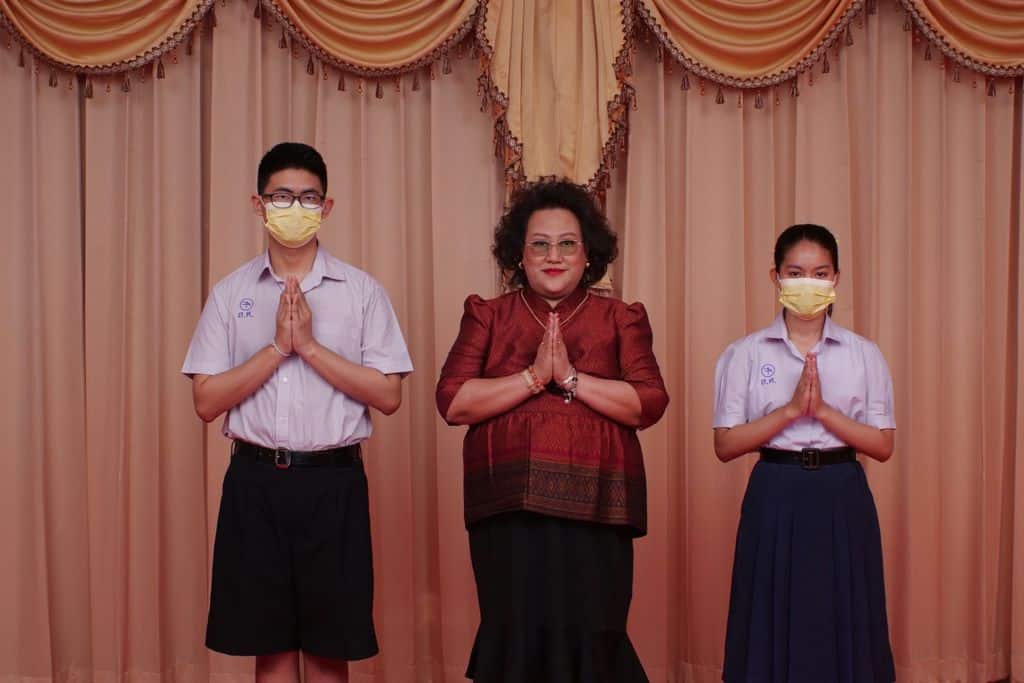
We have our share of nepotism and corruption.
So yes, we have the same things.
Teachers in the movie don't understand where the problem comes from. For them whatever is happening, puts them in a bad light as a school. Is it like the older generation doesn't understand education-related human rights issues?
Yes, this is one of the reasons. They also believe that it is a part of teaching, to have power. And they will be defending themselves that kids are troublemakers, you have to show them the way. When you are mad, you lose your temper, and they often do dealing with pupils. We are taught to respect our elders and seniors, it is taken for granted. You don't have to deserve the respect. Some of the teachers are not conscious they are doing something wrong. But some of them feel their power and enjoy it. They know they are above everything and nobody would question their doings.
So like this old type of educational system shapes obedient citizens, who don't ask government questions.
It's also a generational thing. Remember the pictures I've shown you today, with tear gas and rubber bullets? If I've shown them to my mum, because my mum is a pro-government person, she would find some explanations, like the protesters were armed or something. You have to choose sides. And choose them based on actions. Some people just support the government, no matter what they do. When you are Thai, they say you have to do three things. First, to love your kind, two – be a good citizen, and the blah, blah, blah. And when you ask why, you are told “no, don't ask why”. “Why” is not a good question. And you hear, oh, you're a kid, you don't understand. And you keep hearing all that good stuff about the monarchy. And some people believe in that. “Oh, you can't say things like that about our king, he is so cool.” Yeah, shit, you've been brainwashed.
We've been talking about not-so-cheerful subjects for a while. But your movie is not a serious drama. It's a satire, a comedy. Where does it come from? Why did you decide to make a comedy on serious matters?
It's a hard question, and I am being asked a lot. It's because I am Thai. We grow up like that. For me, making people laugh is my weapon. I hope that when I mock the situation in this way, people supporting the royal family will start thinking. It's not an easy or fast way to achieve a goal. But if I put things directly and frontal, I would land in big trouble. Also, I like joking since I remember. And humor is present also in my short films.
Was it difficult to get funding, considering the subject? And Anthony Chen, the director of “Ilo, Ilo” and “Wet Season” was one of the producers. How did you get him on board?
It's an 8-year project, so money came from many different sides. For the national funding, we needed to say half-truths, like the movie is about cheating during exams, not that it's about the educational system. [laughter]. Oh shi*, this is my country!
Sorayos points to the big TV screen above us (we sit in a hotel lobby). The international news broadcast is on, and they cover the APEC summit. We follow it for a short while. Sorayos notices with disappointment they didn't show the protests.
Ok, so the funding… We also got a grant from Rotterdam International Film Festival in 2015. As to Anthony, he knew my short film, which was screened at various festivals and he believed in my shorts. His country inaugurated this South-Asian cooperation grant. We talked before the pandemic, so we talked about it when the movie subject was different. I am not sure if they know what it's targeting now [laughter]. I worked more with Anthony's producer. But she knows, I told her. [laughter]. And afterwards, we got some money from France and the Netherlands. We got it in 2020 and Covid happened. So we had to postpone the shooting. And when we were shooting, it wasn't over yet, so we had to cover faces a lot. [laughter]
Do you think your shorts circulating at various international festivals helped you?
I think so. And also you meet people during festivals.
Apart from being the director, you work also in the sound department. You even made a short “Death of the Sound Man.” It is not the connection you meet very often, the director and a sound man. So my question is why sound?
The first answer that comes to my mind is “Why not” [laughter]. Of course, when I studied I wanted to be a director. But it is not so easy, especially right after graduation. I wanted to be a part of the crew, to understand their work. I was considering being AD because he cooperates so closely with the director. But it involves a lot of dealing with people, and you have to be familiar with the equipment, and back then my knowledge was limited. Around that time, I started watching arthouse movies, both from Thailand and international. I noticed the difference between the sound in Hollywood and indie movies, and I noticed the presence of sound in indie movies. The other thing is that job is less competitive. Everyone wants to be a director or DOP. Nobody dreams of becoming a sound specialist. Currently, not many people call me to make sound for them. I guess it's because I talk shit a lot. [laughter]. And because I am also the director, they ask “Are you going to listen to me?” Of course, I answer yes [laughter]. So not dealing much with sound now, but I haven't sold my equipment yet. [laughter]


